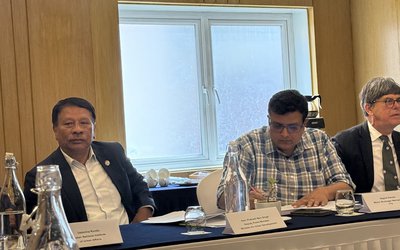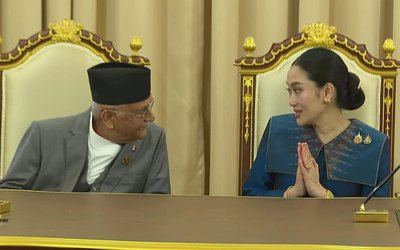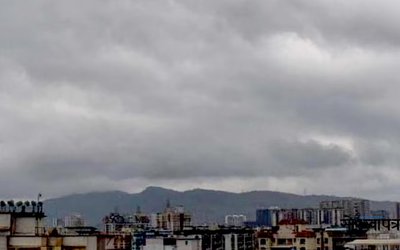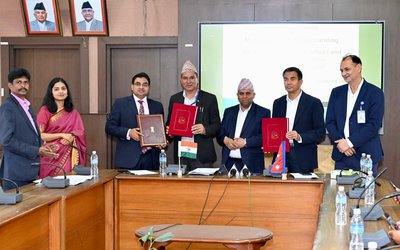Not only those at the helm of affairs in this country, even people on the street should be happy that economy of Nepal grew by about 7 percent last fiscal year, which should be considered an impressive growth rate. Growth has ranged between 6 to 7 percent in the last three years, which saw Deuba, Prachanda and Oli as heads of government. Like Oli and his finance minister Khatiwada,Deuba,Prachanda and their respective finance ministers should feel good that the long-ailing economy grew well during their time of governance.Prachanda blew his trumpet at the time of his exit and Deuba is yet to claim credit for the good that happened during his tenure. Prime Minister Oli, buoyed by 7 percent growth, roared in the House and claimed that the economy will soon grow by 11 percent. We should wish our leader good luck but he should not forget that occasional growth of above 5 percent so far has depended largely on rains from the sky. Oli needs to be honestly informed about all the economic indicators, which are not encouraging, instead of painting for him a rosy picture of the economy based just on growth. Prime Minister Oli is advised to look into the following facts seriously, which would show how the economy has performed in the recently concluded fiscal year and also enable him to compare his government’s performance with the work of his predecessors.
In the fiscal year 2075\76 (2018\19), Nepal traded with 157 countries and suffered deficit with 134 of them. Afghanistan was one of the 23 countries that Nepal had trade surplus with. Trade deficit reached Rs. 1321 billion, exceeding the initial budgetary estimate of Rs. 1315 billion by Rs.6 billion. If the deficit is examined in the light of actual budgetary expenditure (Rs.1066 billion), trade deficit looks all the more serious, exceeding the actual total budgetary expenditure by more than Rs. 255 billion. Trade deficit in 2073\74 was Rs. 917 billion and in 2074\75, it was Rs.1163 billion The duo (Oli\Khatiwada), however, need not feel seriously guilty because, export\import ratio, although alarming now, has continued to deteriorate since long.In the last 10 years, trade deficit skyrocketed by 300 percent, reaching more than Rs. 1300 billion from a low of Rs.3.27 billion some ten years ago. In the last two fiscal years, trade deficit increased by Rs 246 billion. Indeed, there is no need for anyone to hesitate to put the true picture of the economy before everyone and invite the concerned for implementable suggestions. A problem of serious magnitude is before all of us, warranting urgent attention.
It has already been shown earlier that there remains a sizeable gap between what is set aside in the budget as the total outlay in the beginning and what is actually spent. A sizeable gap is often seen and the situation looks more pathetic as far as the case of capital expenditure is concerned. Money (Rs. 311 billion) set aside under capital expenditure head last fiscal year could not be spent as the government ended up spending only Rs. 2o9 billion, failing to meet even its own revised target of Rs.265 billion. Capital expenditure in 2073\74 was Rs.199 billion and in 2074\75 (2018\19) it reached Rs.263 billion. Equally disappointing remained the position of seven provinces where sizeable budgetary amount remained unspent. This is a common problem and needs solution to avoid its unpleasant recurrence in this country that needs lots of resources, both internal and external, to achieve prosperity as desired by our Prime Minister. This scribe has written and spoken umpteen times that to ensure successful implementation of budgets in federated Nepal, a mere transfer of resources from the center to different federal units will not suffice if these are not supported by technical manpower. The current situation is the result of Kathmandu not being able to technically backstop provincial as well as local level governments. These things, however, are not uncommon in a period of transition and can be digested provided the situation does not occur time and again.
Following the footsteps of huge trade deficit, balance of payment (BOP) also remained negative by more than Rs.67 billion last fiscal year, while in 2073\74,it was positive by Rs.82 billion and in 2074\75,it remained positive just by Rs. 96 crore(.96 billion). BOP remained negative in most months of this year also, but the year ended exhibiting a small surplus. Unfortunately in 2075\76, BOP remained negative throughout and the year ended showing a huge deficit. Very disappointing is the fact that service account also ran into deficit (Rs.16.5 billion) for the first time last fiscal year. It may be mentioned that Nepal did face BOP problems many times in the past also and at times had to approach International Monetary Fund (IMF) to address the problem. There is no need to approach IMF immediately but in the event of our trade position continuing to deteriorate and inflow of funds into the country registering a serious decline, Nepal may soon face a crisis of unprecedented magnitude. Indeed, net foreign direct investment (FDI) also dropped to Rs. 13 billion in 2075\76 from Rs. 17 billion in 2074/75. It was Rs. 13.5 billion in 2073\74. Current account deficit also increased from Rs. 247 billion in 2074\75 to Rs. 265 billion in 2075\76.It was positive by Rs. 10 billion in 2073\74.Foreign exchange reserve has also declined over time, from equivalent of Rs. 1102 billion in 2074\75 to Rs. 1038 billion in 2075\76.It was Rs. 1079 billion in 2073\74.Revenue target of Rs.981 billion was adjusted downward twice to fix it at Rs. 860 billion, which was conveniently exceeded, as desired, at the yearend.Further,inflation,which remained at a moderate level for a very long time, has begun to rise. Last fiscal year, it was 6.6 percent year-on-year as against 4.58 percent a year earlier. Rice production had increased last year and year before but in the current fiscal year it is reported to decline by 5 percent, which is certain to adversely affect gdp this year. Although there is no need to panic, the concerned cannot afford to ignore these problems because a crisis could easily engulf the fragile economy of Nepal soon. Wise thing to do, therefore, would be to accept the reality and confront the problem, soliciting cooperation from every corner. There are problems of varying nature and level all over the world, which are being faced bravely to find solutions thereof. Nepal is not the only country in problems and there is absolutely no need to veil existing realities.
The trade war that started in 2018 is thought to adversely affect the global economy, despite the fact that the damage done so far is not much and American economy appears stronger than before. The two presidents (Trump and Xi) look sea-sowing on matters related to introduction and increase of tariff on each other’s goods and resumption of negotiations to reach a deal. It has become very clear that China does not waste much time in announcing retaliatory measures when threatened by the United States, which under Mr. Trump thinks that a booming economy is possible with the help of tariff and a cheap dollar. China is also not letting its currency appreciate recently, despite refuting currency manipulation charges, and has done a lot in diversifying its trade in recent times. European Union (EU) has emerged as China’s largest trading partner, replacing US and its trade with the Belt and Road Initiative (BRI) economies has gone up by 10.2 percent year-on-year, explaining 28.9 percent of China’s total trade volume. China is also likely to benefit from the currently discussed Regional Comprehensive Economic Partnership (RCEP), a free trade mechanism between ASEAN, China, Japan, the Republic of Korea, Australia, India and New Zealand, that together account for 45 percent of global population, 40 percent of world trade and one-third of global gdp.Fully aware of the trade-related problems and conscious of recent drop in its gdp to 6.2 percent, China is busy exploring new markets and generating fresh demand. Escalating trade war between the two largest economies has made the two countries very serious and are seen endeavoring to progress further without letting their economies suffer a setback. They are open about it.
Boris Johnson probably did not imagine that his decision to suspend British Parliament in the final weeks before the country’s EU departure date would trigger such a serious backlash. Over 1 million people have signed petition to reverse the decision. Johnson seems to have taken this decision to give pro- Lawmakers less time to thwart his plans for a possible no-deal Brexit on October 31. This move has enraged anti-Brexit parliamentarians who have branded Johnson’s move a coup and declaration of war. Protesters in large numbers have taken to streets all over BriItain.It may also be noted that Britain contributes 13 billion pound annually to EU budget and suffers a trade deficit of 56 billion per annum. Britain’s head of government appears determined to take an exit even at the cost of a no-deal, which, according to many, may expose British economy to mountains of problems. President Trump has admired this move and looks ready, pen in hand, to sign a trade deal with Britain. Johnson,also facing opposition from his own party lawmakers, is aware that he will continue to have problems but looks determined to face them boldly and in a transparent way.
The recent slowdown in Indian economy (5 percent apprhended) has become a matter of serious concern for Indians who are eager to see their country left not far behind the United States and China in terms of economic strength. The government is serious about it because the Indian economy has started slowing down at a time when Prime Minister Modi has declared that it will hit a 5 trillion dollar mark in five years, which requires a growth rate of 7 percent per annum. Indians have begun to delve seriously into the matter and are likely to take appropriate measures to beat the slowdown. They are more or less certain that growth will come from export and modernization of agriculture. Looks like government of India is working on creating favorable conditions to further facilitate inflow of foreign investment into the economy. Everything related to this new problem is open and it is interesting to observe public discourses participated in by knowledgeable people from the government as well as private sector. Hope the revocation by government Of India of special status accorded to Jammu\Kashmir does not seriously deflect the attention of Indian leaders at a time when the current unsatisfactory state of the economy demands their prime attention and quality time.
There are problems all over the world and we need not panic looking at our problems, if we have the determination to confront problems honestly. A confession that our economy is in a bad shape, by those at the helm of affairs, should be the starting point. Confession should not be difficult to come by when one remembers how bad was the situation last fiscal year when trade deficit increased in an unprecedented manner, BOP remained negative throughout the year, capital expenditure took a nose dive, foreign exchange reserve showed depletion, FDI decreased and revenue target had to be changed time and again. Mere professing about growth and prosperity is not going to help because it is difficult to see which sector of the economy is emerging as an increasingly powerful growth engine to fulfill the proclaimed 11 percent growth.

Dr. Tilak Rawal
Dr. Rawal is former governor of NRB.
- Six Months Of Deuba And Oli
- Jan 25, 2025
- Prachanda Outsmarted
- Jul 19, 2024
- Prachanda Outsmarts Again
- Apr 14, 2024
- Prachanda Completes One Year
- Jan 26, 2024
- Terrible Times To Continue
- Oct 12, 2023














